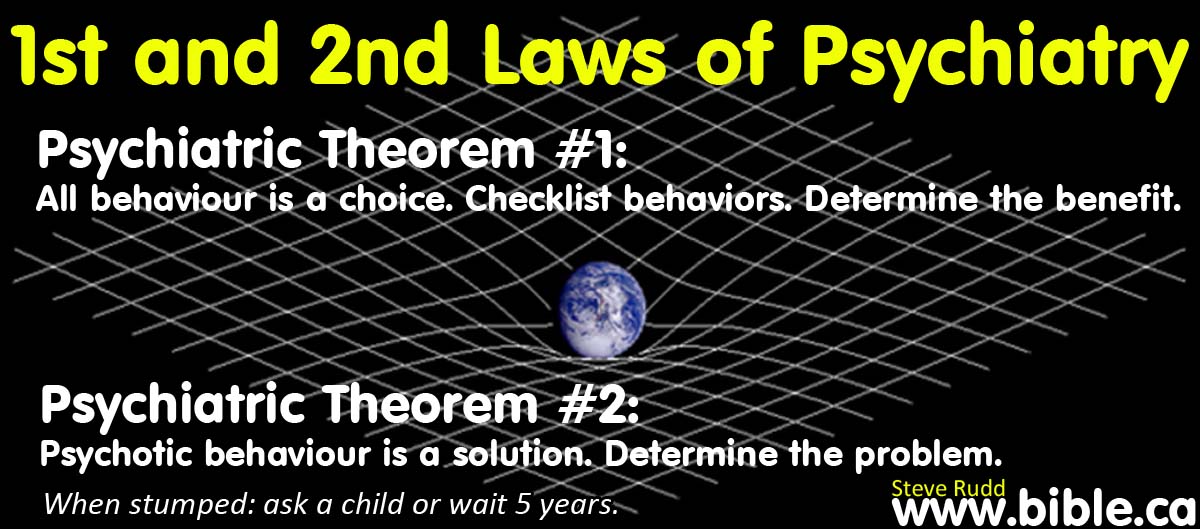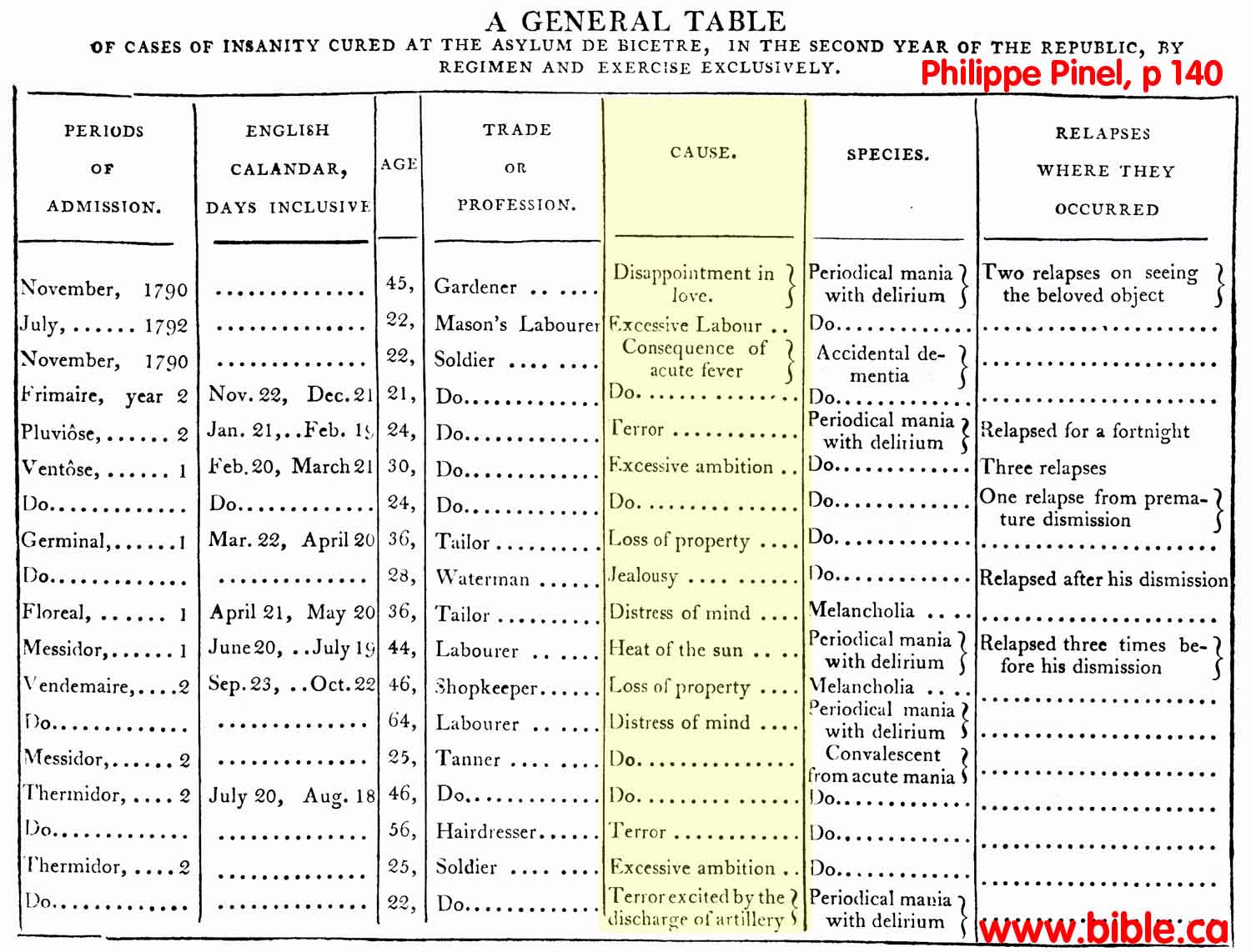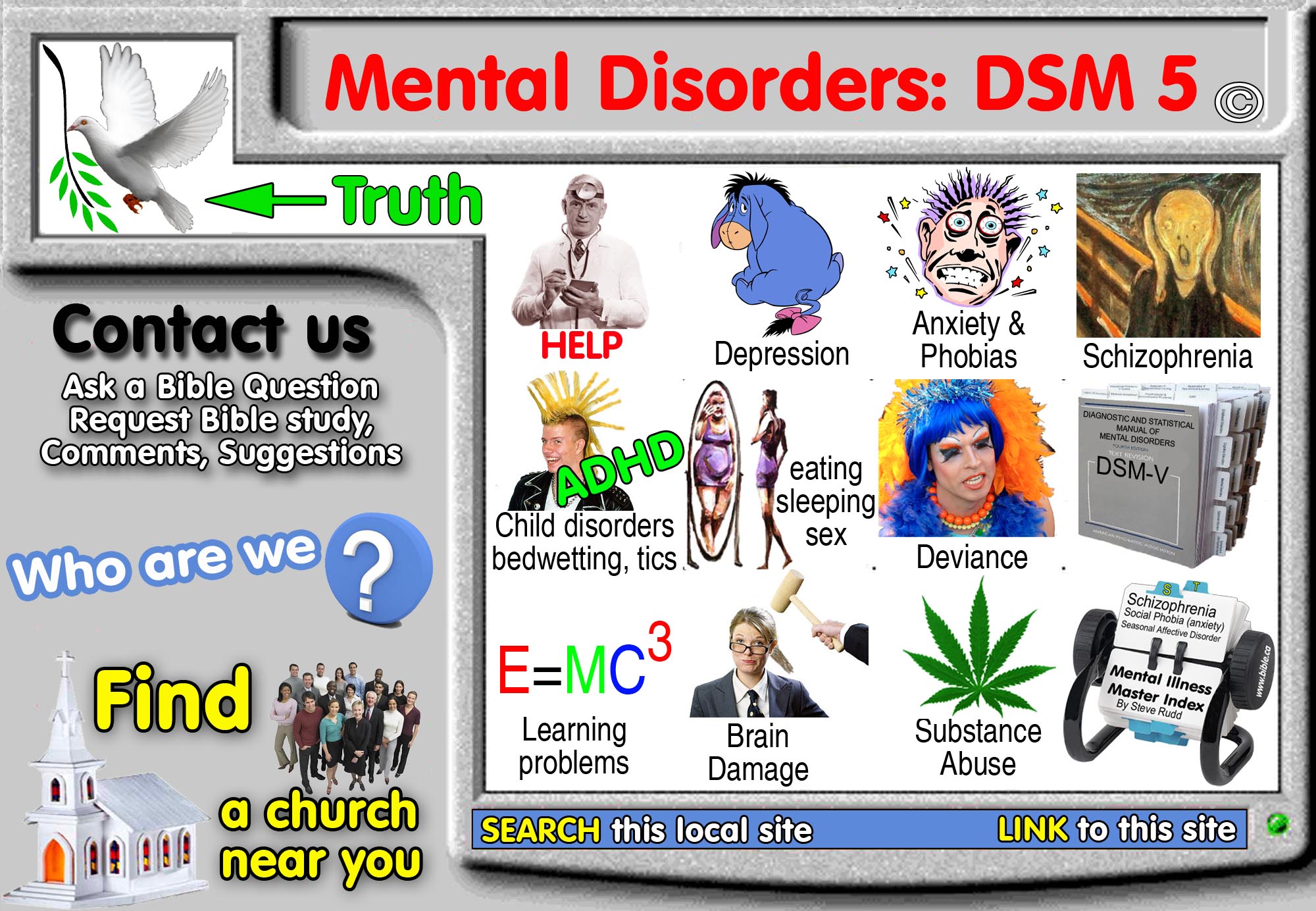The case of "Dogs" (depression, schizophrenia)
Casebook of Biblical Psychiatry © Version 7
|
Based upon: |
Casebook of Biblical Psychiatry© brings the principles of Biblical Psychiatry to life based upon real-world cases and familiarizes Christians with different types of situations. This practical companion volume to Biblical Psychiatry© includes not only diagnosis, but also in-depth discussions by experienced Christians for Biblical approaches to treatment. This meticulously detailed volume of dynamic real-life case studies is simply a "must read" for all clinical Psychiatrists, mental health care professionals and Christians interested in expert opinion on today's treatment approaches. Psychiatric students, educators, and practitioners—as well as social workers, nurses, medical physicians, and interested laypersons—will find this unique volume of inestimable value in their day-to-day work.
|
|
|
|
||||
|
The case of "Dogs" (depression, schizophrenia) |
|
|||||
|
|
||||||
|
|
The case of "Dogs" |
|
||||
|
|
Biopsychiatric labels DSM-5 |
Schizophrenia, delusion, paranoia |
||||
|
|
Checklist Behaviours DSM-7 |
unforgiveness, deception, depression, grudges, uncontrolled anger, rage |
||||
|
|
Insights MMPI-7 |
|
||||
|
|
Quick Pick EDS-7.1 |
Insanity. Complaints: I feel Used by others, I experienced Divorced |
||||
|
|
Self-disablement EDS-7.2 |
Employment: Time in asylum, then five years on disability |
||||
|
|
Chemical imbalance EDS-7.3 |
Yes. He ingested psychiatrist prescribed drugs for years. This indicates he likely has brain damage and Tardive Dyskinesia |
||||
|
|
Benefits EDS-7.4 |
Attention seeking, Pride, Praise, Honour, Fame: EDS-7.4.3 Escape duty or life situation: EDS-7.4.4 Sympathy: EDS-7.4.5 Revenge: EDS-7.4.8 Victimhood: EDS-7.4.13 |
||||
|
|
Monetary EDS-7.5 |
On psychiatric welfare for 5 years. |
||||
|
|
Annoyance Scale EDS-7.6 |
Medium |
||||
|
|
Diagnostic Laws EDS-7.7 |
Law of Narcissistic Behaviour Choice (NBC) EDS-7.7.1.NBC Law of Derivative Personal Benefit (DPB) EDS-7.7.2.DPB Law of Narcissistic Selective Dysfunction (NSD) EDS-7.7.3.NSD Law of Diagnostic Anosognosia Relativism (DAR) EDS-7.7.7.DAR Law of Locus Pentaphasic Transmutation (LPT) EDS-7.7.11.LPT |
||||
|
|
Determine the Problem |
Grudge keeping, self-pity, lack of acceptance of life situation |
||||
|
|
Ask a Child |
He is sad because his wife left and missed her. EDS-7.7.12.PMO |
||||
|
|
5 years later EDS-7.7.LPT |
Repented of depression and restored. |
||||
|
|
|
|||||
The case of "Dogs"
Andrew was a young Christian who had been raised in the church by two godly parents from a wealthy stable home. He fell in love and married a newly converted Christian woman after only three months of dating. Two children were born into this somewhat stormy relationship. His wife would constantly yell at both him and the kids for no reason at all. Eventually, she made up slanderous accusations of adultery against her husband to "justify" splitting with the kids. Andrew desperately, but futilely sought reconciliation and was devastated by the loss of his wife and children.
When it became obvious that reconciliation with his wife was impossible Andrew became very angry. His anger intensified and he became noticeably bitter. Over a period of 6 months, this bitterness, combined with sleep deprivation (often 4 nights in a row) resulted in paranoia and psychotic behaviour. His paranoia led him to tell members of the church that he "knew" for certain that someone had trained the dogs in his neighbor hood to attack him. He invited two men from the congregation to spend an evening with him in the back yard as proof. They sat in the back yard for hours and several times the sound of 3 different dogs could be heard barking in the distance. "See. I told you! They are planning their attack on me."
He was committed to the psychiatric ward where he was drugged into submission. His bizarre paranoia allowed his wife to obtain a permanent injunction against seeing his children. Because of the anti-psychotic drugs he was unable to work and he got fired from his job. This only intensified his anger against his wife. He had to go on welfare.
In court, the judge ordered him permanently drugged, resulting in permanent disability.
A Christian named James talked to Andrew and told him to repent about the anger and bitterness. James told Andrew that being angry and bitter was a sin and he had better stop feeling this way, accept his life for what it had become and move on. This resulted in a significant long term improvement that was noticeable to all.
However, it took him over 5 years to get the court order removed that forced him into taking the mind numbing drugs which were the real cause his disability and losing his job.
Ten years later, Andrew is happily remarried and able to support his new family with full time employment.
Discussion:
There is a long historical trail of individuals who have gone insane because of "love lost". Hospital records of Philippe Pinel at the Bicetre asylum from the 1790 AD, list a gardener aged 45 years old, "disappointment in love" as the etiology with psychotic behaviors that include mania and delusions. This man had two relapses "on seeing the beloved object" or when the woman that dumped or divorced him came to visit him in the hospital. This is precisely identical to what happened to Andrew.
Notice that Andrew was actually disabled by the neuroleptic drugs prescribed to him by the psychiatrist. All prescribed psychiatric drugs, including heroin, cocaine and alcohol, all have the same effect on the person in that they cause disablement. They are a chemical lobotomy that scales down executive function so that a person is not as creative, doesn’t enjoy music as much, is lethargic and indifferent etc.
Benefits from behaviour: This illustrates the Law of Narcissistic Behaviour Choice (NBC) EDS-7.7.1.NBC
- Attention seeking, Pride, Praise, Honour, Fame: EDS-7.4.3. Andrew wanted others to notice his misery, especially his wife.
- Escape duty or life situation: EDS-7.4.4. He didn’t like being divorced. In order to escape the real world he did not like, he created his own fantasy world as an escape.
- Sympathy: EDS-7.4.5. Andrew desired compassion for his injury. Sometimes hurting people have an unnaturally high need for sympathy and compassion.
- Revenge: EDS-7.4.8. Andrew wanted revenge against his wife for hurting him. His "mental illness" would "make her pay" and show her and everyone what she did to him. He was making himself a victim.
- Victimhood: EDS-7.4.13. Andrew was a jilted lover whose life collapses into depression after being dumped. This behaviour choice was in fact a victimhood strategy to gain the benefit of revenge against the one who dumped them. Victimhood was Andrew's way of obligating his wife to return as a payment she owed for damages (depression) when she abandoned him.
Diagnostic laws that are seen illustrated in the case of "Dogs":
- Andrew calculated that the cost of being labeled insane, was lower than the benefits he derived by escaping a heart breaking life situation. This illustrates the Law of Derivative Personal Benefit (DPB) EDS-7.7.2.DPB
- While Andrew had difficulty functioning 100% while on psychiatric drugs, full disablement to the point of unemployment indicates he didn't really want to work. Meanwhile, he functioned adequately to pursue legal action to get himself removed from the drugs. This illustrates the Law of Narcissistic Selective Dysfunction (NSD) EDS-7.7.3.NSD
- Andrew knew that the drugs were not fixing a medical problem and he strongly rejected the need to take them. However being under a court order, he had no choice. This illustrates the Law of Diagnostic Anosognosia Relativism (DAR) EDS-7.7.7.DAR
- At the beginning of the five year period, Andrew was depressed and psychotic. At the end of the five years, he was off neuroleptics amd back at work. This indicates that he had a change of heart and decided to finally move on with his life. He finally accepted the injury he suffered at the hands of his first wife. This illustrates the Law of Locus Pentaphasic Transmutation (LPT) EDS-7.7.11.LPT
Note: Although these are based upon real case stories, the names and details have been changed to hide the identities of the people. This practice follows the standards of medical case history publication.
By Steve Rudd: Contact the author for comments, input or corrections.
Send us your story about your experience with modern Psychiatry



